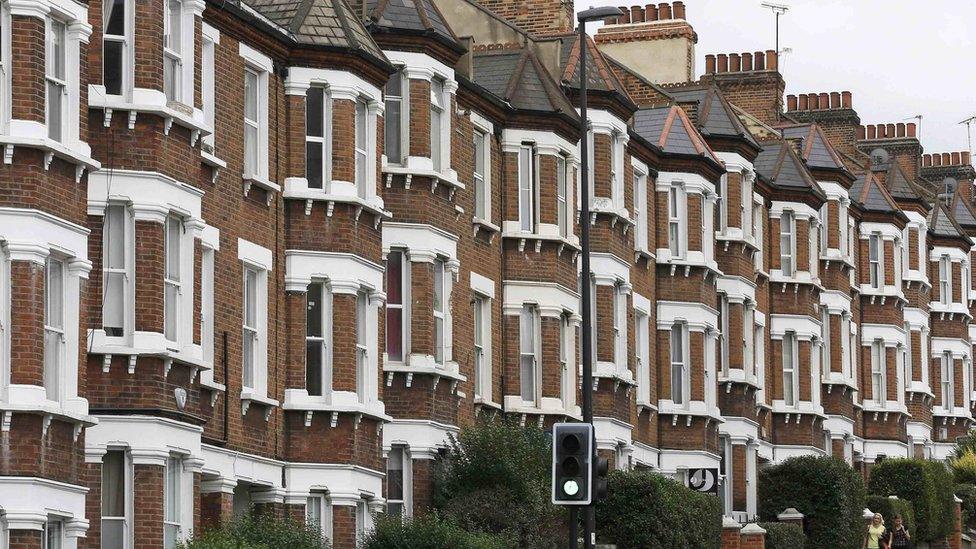Renters would get longer tenancies under government plans
- Published

A minimum tenancy term of three years would be introduced under government proposals to give people renting homes in England more security.
Figures show 80% of tenants currently have contracts of six or 12 months and ministers say longer agreements would allow them to put down more roots.
They add tenants would be able to leave earlier under the plans while landlords would get more financial security.
Labour says the plans do not go far enough and rent rises should be capped.
Polly Neate, chief executive of housing charity Shelter, said loss of tenancy was "the main driver of homelessness" and called for the government to "go beyond three years".
A consultation on the minimum tenancy term will run until the end of the August.
Exemptions to the rules could apply to some types of tenant - for instance those in student accommodation.
Government figures show renters do stay in a property for an average of four years but most have shorter contracts.
'I'll be renting until I die'
George Robertson, a landlord from St Albans, is concerned about how the proposals will affect him.
"I am a landlord with one house used as a pension top-up after my wife's state pension age was hiked up at short notice," he said.
"We feel this proposal will force small landlords like us, with just one property, out of the market [and] it will make it so much harder to manage difficulties with problem tenants.
"If this becomes law I will sell my property as we couldn't face the hassle of dealing with possible issues."
Jonathan Pearson, a renter living in London, is worried the proposals will mean less flexibility for tenants.
"If in future I say I only plan on renting for less than three years, that would reduce my chances of securing a property," said Mr Pearson.
He said the real problem was the "attitude of estate agents", who treat tenants as a "commodity" and "charge ridiculous tenancy renewal fees after the 12 month period is up".
'Putting down roots'
But Communities Secretary James Brokenshire said it was an important step forward for tenants.
He added: "It is deeply unfair when renters are forced to uproot their lives or find new schools for their children at short notice due to the terms of their rental contract.
"Being able to call your rental property your home is vital to putting down roots and building stronger communities."

Analysis
By BBC business correspondent Joe Lynam
Something significant has happened to home ownership in the UK - it's dropped from 72% a decade ago to 63% last year.
Much of that is down to affordability - especially in the south east of England, bank reticence to lend and stagnant real wages. That has meant that the number of people who need to rent is rising.
The proportion of 35 to 54-year-olds who live as private tenants has nearly doubled in 10 years.
Meanwhile, protections afforded to renters have not kept pace. So, any plan to impose minimum terms to rental agreements of three years would benefit millions hoping for some security of tenure.
But it may also cause problems. Landlords could have less flexibility in financing of their properties and have to pay higher interest rates to lenders, which could then be passed on to tenants.
Furthermore, tenants may not like being locked into long-term contracts if their own circumstances change and they need to move or even buy a house.
Finding a middle ground won't be easy in the consultation.

Shadow housing secretary John Healey said: "Any fresh help for renters is welcome but this latest promise is meaningless if landlords can still force tenants out by hiking up the rent.
He said Labour plans included controls on rents, an end to no-fault evictions and protection against substandard properties.
Polly Neate, chief executive of charity Shelter, said: "This is an important step forward. Losing a tenancy is the main driver of homelessness and also causes huge instability for renting families so everyone who rents will be very pleased to see a move towards longer tenancies.
"But if the government really wants to stand up and provide stability for renters, they can and should go beyond three years to provide real protection from eviction, and the huge upheaval of having to move home, jobs and schools.
"The government needs to bring forward new legislation quickly - with tens of thousands of families already homeless and many more at risk of the same fate, we simply cannot wait."

- Published11 May 2018

- Published22 May 2018

- Published17 April 2018
- Published25 March 2018

- Published19 February 2018

- Published3 December 2017
